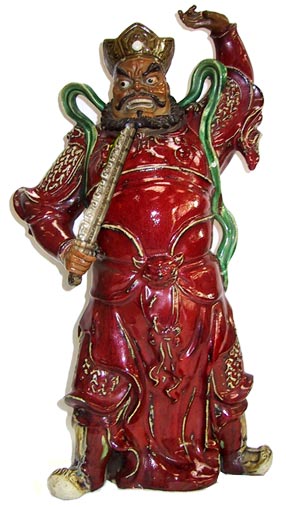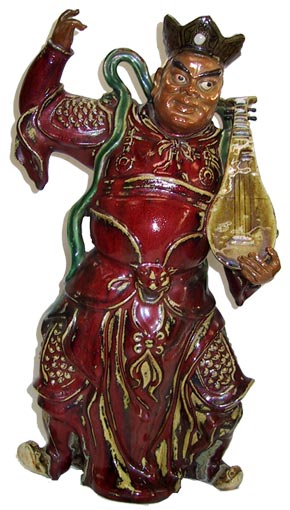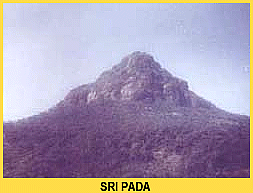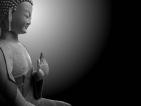The Blessed,Noble,Awakened One-The Tathagata
sighting shore {seeking the Buddha; meaning of Tathagata}
Conversations with the Gods
“Once, Kevatta,  this train of thought arose in the awareness of a certain monk in this very community of monks: ‘Where do these four great elements — the earth property,
this train of thought arose in the awareness of a certain monk in this very community of monks: ‘Where do these four great elements — the earth property,  the liquid property,
the liquid property,  the fire property,
the fire property,  and the wind property
and the wind property ![]() — cease without remainder?’ Then he attained to such a state of concentration that the way leading to the gods appeared in his centered mind. So he approached the gods of the retinue of the Four Great Kings and, on arrival, asked them, ‘Friends, where do these four great elements — the earth property, the liquid property, the fire property, and the wind property — cease without remainder?’
— cease without remainder?’ Then he attained to such a state of concentration that the way leading to the gods appeared in his centered mind. So he approached the gods of the retinue of the Four Great Kings and, on arrival, asked them, ‘Friends, where do these four great elements — the earth property, the liquid property, the fire property, and the wind property — cease without remainder?’
“When this was said, the gods of the retinue of the Four Great Kings 


 said to the monk, ‘We also don’t know where the four great elements… cease without remainder. But there are the Four Great Kings who are higher and more sublime than we. They should know where the four great elements… cease without remainder.’
said to the monk, ‘We also don’t know where the four great elements… cease without remainder. But there are the Four Great Kings who are higher and more sublime than we. They should know where the four great elements… cease without remainder.’

“So the monk approached the Four Great Kings and, on arrival, asked them, ‘Friends, where do these four great elements… cease without remainder?’
“When this was said, the Four Great Kings said to the monk, ‘We also don’t know where the four great elements… cease without remainder. But there are the gods of the Thirty-three who are higher and more sublime than we. They should know…’
http://www.tientai.net/teachings/dharma/6realms/33gods.htm
Trayastrimsas
The Heaven of the Thirty-Three Gods
The Heaven of the 33 Gods (S. Trayastrimsas) is the heaven that rules over the secular world we live in. It is the realm of the gods that watches over the affairs of humanity. Its lord is Sakra Devendra, wielder of the thunderbolt (vajra) who personifies the will and power of heaven and mastery over the self. As lord of the secular world, he resides in his palace in the City of Beautiful Vision (Sudarsana) atop Mt. Sumeru, the highest point as well as the center of the world. His name means Almighty (Sakra) Divine (Deva) Conqueror (Indra). The name probably originated from the leader of the Aryans who led them in conquering the peoples of southerm Asia in the period prior to the appearance of the Vedas (c. 1000 BCE).
There are 32 Gods who report to him on the good & evil done in the world. These 32 Gods are the rulers of our higher natures as gods of this world. These 32 are divided into:
1. An agent of creation - Prajapati
2. Agents of preservation and stability - the Twelve Adityas, or Sovereign Principles
3. Agents of destruction and transformation - the Eleven Rudras, the Wailers or Screamers
4. The spheres of their activity - the Eight Vasus, or elements

1. Prajapati  is the lord & master of creation, the creator and producer of all things; He is divine providence; In nature, he is the the one who brings all things into existence in this world. In man, he personifies the boundless creativity of the human spirit.
is the lord & master of creation, the creator and producer of all things; He is divine providence; In nature, he is the the one who brings all things into existence in this world. In man, he personifies the boundless creativity of the human spirit.
http://www.geocities.com/takoda_magick/hindudevas.html
2. The Twelve Adityas: The Twelve Sovereign Principles that lead to stability and order in the world
|
# |
Sanskrit |
Principle |
Realm |
Importance |
|
1 |
Mitra |
Friendship; The social contract, the sacred bond between people |
Of |
Major |
|
2 |
Aryaman |
Honor; Nobility, honesty, trust, good faith, truth to principles |
||
|
3 |
Bhaga |
One’s share; The giving, doing & accepting of one’s fair share |
||
|
4 |
Varuna |
Fate; The relation between god & man, the favor of the gods |
Beyond |
|
|
5 |
Daksa |
Ritual efficacy; The proper rules of ritual skill, of making sacrifices |
||
|
6 |
Amsa |
The share of the gods; That which is sacrificed |
||
|
7 |
Tvastri |
The shaper; Industry, craftsmanship, workmanship |
Of |
Minor |
|
8 |
Pusan |
The nourisher; Agriculture, abundance, that which offers inner security |
||
|
9 |
Visvavat |
The righteous; Morality, justice, the laws of man |
||
|
10 |
Savitra |
The Vitalizer; The power of words as magic weapons |
Beyond |
|
|
11 |
Sakra |
The Potent; Courage, heroism, valor, that which offers outer security |
||
|
12 |
Vishnu |
The Pervader; Knowledge, wisdom, perception of reality |
3. The Eleven Rudras: The agents of destruction, transformation and change.
A. #1 - #5 represent the manifestation of speech from the mind.
B. #6 - #10 represent the rulers of space
C. #11 represents the soul
A. The Manifestation of speech from the mind:
|
# |
Sanskrit |
Meaning |
Descrption |
Personificaton |
|
1 |
Ananda |
Bliss |
The calm, silenced mind beyond thought; The motionless ocean of bliss | The Conqueror of Death (Mrityum Jaya) who is beyond desire. |
|
2 |
Vijnana |
Knowledge |
Beginning of an idea, the power of intellect, the inner vision the mind tries to express; the first blurring of the waters | The Southern Image (Daksina Murti); The south being the manifestation & the north being the source |
|
3 |
Manas |
Thought |
Reduction of idea into word form, into code for the five senses |
The Lord of Lust-Sensory Desire (Kamesvara); Growth and development of the seed of thought |
|
4 |
Prana |
Breath |
The word brought forth by vital breath, becoming alive & reined to the five senses and manifested | The Herdsman (Pasupati), who reins and guides the flock of the five senses |
|
5 |
Vac |
Voice |
Food (Anna) is the fodder of the body & speech (Vac) is the fodder of the mind. | The Lord of the Elements (Bhutesvara) Food is the substance of vital energy & speech is outward projection of the mind |
B. The rulers of space, the controllers of destiny.
|
# |
Sanskrit |
English |
Meaning |
Sense |
Organs |
Element |
Other |
|
6 |
Isana |
The Ruler |
Enjoyer of nature, the |
Touch |
Hands |
Wind |
Clarity |
|
7 |
Tat-Purusa |
Supreme Person |
Nature, that which is |
Smell |
Oral & Anal |
Earth |
Yellow |
|
8 |
Aghara |
Fearless |
Intellect, granting benefits |
Hearing |
Organs |
Ether |
Blue |
|
9 |
Vama-Deva |
The Left Handed |
Self-consciousness, the ego |
Sight |
The Feet, led |
Fire |
Red |
|
10 |
Satyojata |
Suddenly Born |
Soma, the sacrificial elixir |
Taste |
The Organs |
Water |
White |
C. The Soul; the higher self
|
# |
Sanskrit |
English |
Meaning |
|
11 |
Atma |
The Soul |
The higher self, the conscience with its aspect of free will |
4. The Eight Vasus: The Realms of the Gods
|
# |
Sanskrit |
English |
Meaning |
Element |
|
|
1 |
Prithivi |
Mother Earth |
The body and the food of life & source of abundance, in which dwells: |
Earth |
|
|
2 |
Agni |
Fire |
The mouth of the gods, which consumes & digests the earth |
Fire |
|
|
3 |
Antariksa |
The Atmosphere |
The waters; Sphere between heaven & earth, in which dwells: |
Water |
|
|
4 |
Vayu |
The Wind & |
The breath of the gods, the powerful & often destructive flows of energy & life |
Wind |
|
|
5 |
Dyaus |
The Sky |
Father of sun, moon & stars, fertilizing mother earth with rain, in which dwells: |
The Day |
The Ether |
|
6 |
Surya |
The Sun |
Source of warmth, light, and life |
||
|
7 |
Naksatra |
The Stars & |
Realm beyond humanity where universe was born, in which dwells: |
The Night |
|
|
8 |
Soma |
The Moon |
Vessel of soma elixir, ruling over tides, plants, animals & sexual energy | ||
“So the monk approached the gods of the Thirty-three and, on arrival, asked them, ‘Friends, where do these four great elements… cease without remainder?’
“When this was said, the gods of the Thirty-three said to the monk, ‘We also don’t know where the four great elements… cease without remainder. But there is Sakka, the ruler of the gods, who is higher and more sublime than we. He should know… ‘
“So the monk approached Sakka, the ruler of the gods, and, on arrival, asked him, ‘Friend, where do these four great elements… cease without remainder?’
http://www.watchai.iirt.net/america1.html



“When this was said, Sakka, the ruler of the gods, said to the monk, ‘I also don’t know where the four great elements… cease without remainder. But there are the Yama gods who are higher and more sublime than I. They should know…’…
“The Yama gods said, ‘We also don’t know… But there is the god named Suyama… He should know…’…
“Suyama said, ‘I also don’t know… But there is the god named Santusita… He should know…’…
http://www.payer.de/mahavamsa/chronik31.htm
“Santusita said, ‘I also don’t know… But there are the Nimmanarati gods… They should know…’…

“The Nimmanarati gods said, ‘We also don’t know… But there is the god named Sunimmita… He should know…’…
“Sunimmita said, ‘I also don’t know… But there are the Paranimmitavasavatti gods… They should know…’…
“The Paranimmitavasavatti gods said, ‘We also don’t know… But there is the god named Paranimmita Vasavatti… He should know…’…


http://home.earthlink.net/~mpaw1238/id63.html
 |
|
“So the monk approached the god Vasavatti and, on arrival, asked him, ‘Friend, where do these four great elements… cease without remainder?’
“When this was said, the god Vasavatti said to the monk, ‘I also don’t know where the four great elements… cease without remainder. But there are the gods of the retinue of Brahma who are higher and more sublime than I. They should know where the four great elements… cease without remainder’…
![[Click to enlarge image]](http://www.indiaoz.com.au/hinduism/god/tn_brahma_2.jpg)
“Then the monk attained to such a state of concentration that the way leading to the gods of the retinue of Brahma appeared in his centered mind. So he approached the gods of the retinue of Brahma and, on arrival, asked them, ‘Friends, where do these four great elements — the earth property, the liquid property, the fire property, and the wind property — cease without remainder?’
“When this was said, the gods of the retinue of Brahma said to the monk, ‘We also don’t know where the four great elements… cease without remainder. But there is Brahma, the Great Brahma, the Conqueror, the Unconquered, the All-Seeing, All-Powerful, the Sovereign Lord, the Maker, Creator, Chief, Appointer and Ruler, Father of All That Have Been and Shall Be. He is higher and more sublime than we. He should know where the four great elements… cease without remainder.’
“‘But where, friends, is the Great Brahma now?’
“‘Monk, we also don’t know where Brahma is or in what way Brahma is. But when signs appear, light shines forth, and a radiance appears, Brahma will appear. For these are the portents of Brahma’s appearance: light shines forth and a radiance appears.’
“Then it was not long before Brahma appeared.
“So the monk approached the Great Brahma and, on arrival, said, ‘Friend, where do these four great elements — the earth property, the liquid property, the fire property, and the wind property — cease without remainder?’
“When this was said, the Great Brahma said to the monk, ‘I, monk, am Brahma, the Great Brahma, the Conqueror, the Unconquered, the All-Seeing, All-Powerful, the Sovereign Lord, the Maker, Creator, Chief, Appointer and Ruler, Father of All That Have Been and Shall Be.’
A second time, the monk said to the Great Brahma, ‘Friend, I didn’t ask you if you were Brahma, the Great Brahma, the Conqueror, the Unconquered, the All-Seeing, All-Powerful, the Sovereign Lord, the Maker, Creator, Chief, Appointer and Ruler, Father of All That Have Been and Shall Be. I asked you where these four great elements — the earth property, the liquid property, the fire property, and the wind property — cease without remainder.’
“A second time, the Great Brahma said to the monk, ‘I, monk, am Brahma, the Great Brahma, the Conqueror, the Unconquered, the All-Seeing, All-Powerful, the Sovereign Lord, the Maker, Creator, Chief, Appointer and Ruler, Father of All That Have Been and Shall Be.’
“A third time, the monk said to the Great Brahma, ‘Friend, I didn’t ask you if you were Brahma, the Great Brahma, the Conqueror, the Unconquered, the All-Seeing, All-Powerful, the Sovereign Lord, the Maker, Creator, Chief, Appointer and Ruler, Father of All That Have Been and Shall Be. I asked you where these four great elements — the earth property, the liquid property, the fire property, and the wind property — cease without remainder.’
“Then the Great Brahma, taking the monk by the arm and leading him off to one side, said to him, ‘These gods of the retinue of Brahma believe, “There is nothing that the Great Brahma does not know. There is nothing that the Great Brahma does not see. There is nothing of which the Great Brahma is unaware. There is nothing that the Great Brahma has not realized.” That is why I did not say in their presence that I, too, don’t know where the four great elements… cease without remainder. So you have acted wrongly, acted incorrectly, in bypassing the Blessed One in search of an answer to this question elsewhere. Go right back to the Blessed One and, on arrival, ask him this question. However he answers it, you should take it to heart.’

“Then — just as a strong man might extend his flexed arm or flex his extended arm — the monk disappeared from the Brahma world and immediately appeared in front of me. Having bowed down to me, he sat to one side. As he was sitting there he said to me, ‘Lord, where do these four great elements — the earth property, the liquid property, the fire property, and the wind property — cease without remainder?’
“When this was said, I said to him,2 ‘Once, monk, some sea-faring merchants took a shore-sighting bird and set sail in their ship. When they could not see the shore, they released the shore-sighting bird. It flew to the east, south, west, north, straight up, and to all the intermediate points of the compass. If it saw the shore in any direction, it flew there. If it did not see the shore in any direction, it returned right back to the ship. In the same way, monk, having gone as far as the Brahma world in search of an answer to your question, you have come right back to my presence.
“‘Your question should not be phrased in this way: Where do these four great elements — the earth property, the liquid property, the fire property, and the wind property — cease without remainder? Instead, it should be phrased like this:
Where do water, earth, fire, & wind have no footing? Where are long & short, coarse & fine, fair & foul, name & form brought to an end?
“‘And the answer to that is:
Consciousness without feature, without end, luminous all around: Here water, earth, fire, & wind have no footing. Here long & short coarse & fine fair & foul name & form are all brought to an end. With the cessation of [the activity of] consciousness each is here brought to an end.’”
That is what the Blessed One said. Gratified, Kevatta the householder delighted in the Blessed One’s words.
Notes
1. Viññanam anidassanam. This term is nowhere explained in the Canon, although MN 49 mentions that it “does not partake in the allness of the All” — the “All” meaning the six internal and six external sense media (see SN 35.23). In this it differs from the consciousness factor in dependent co-arising, which is defined in terms of the six sense media. Lying outside of time and space, it would also not come under the consciousness-aggregate, which covers all consciousness near and far; past, present, and future. However, the fact that it is outside of time and space — in a dimension where there is no here, there, or in between (Ud 1.10), no coming, no going, or staying (Ud 8.1) — means that it cannot be described as permanent or omnipresent, terms that have meaning only within space and time. The standard description of nibbana after death is, “All that is sensed, not being relished, will grow cold right here.” (See MN 140 and Iti 44.) Again, as “all” is defined as the sense media, this raises the question as to whether consciousness without feature is not covered by this “all.” However, AN 4.174 warns that any speculation as to whether anything does or doesn’t remain after the remainderless stopping of the six sense media is to “complicate non-complication,” which gets in the way of attaining the non-complicated. Thus this is a question that is best put aside.
Vajira
Setting at Savatthi. Then, in the morning, the bhikkhuni Vajira dressed and, taking bowl and robe, entered Savatthi for alms. When she had walked for alms in Savatthi [135] and had returned from her alms round, after her meal she went to the Blind Men’s Grove for the day’s abiding. Having plunged into the Blind Men’s Grove, she sat down at the foot of a tree for the day’s abiding.
Then Mara the Evil One, desiring to arouse fear, trepidation, and terror in the bhikkhuni Vajira, desiring to make her fall away from concentration, approached her and addressed her in verse:
By whom has this being been created? Where is the maker of the being? Where has the being arisen? Where does the being cease?
Then it occurred to the bhikkhuni Vajira: “Now who is this that recited the verse — a human being or a non-human being?” Then it occurred to her: “This is Mara the Evil One, who has recited the verse desiring to arouse fear, trepidation, and terror in me, desiring to make me fall away from concentration.”
Then the bhikkhuni Vajira, having understood, “This is Mara the Evil One,” replied to him in verses:
Why now do you assume ‘a being’? Mara, have you grasped a view? This is a heap of sheer constructions: Here no being is found. Just as, with an assemblage of parts, The word ‘chariot’ is used, So, when the aggregates are present, There’s the convention ‘a being.’ It’s only suffering that comes to be, Suffering that stands and falls away. Nothing but suffering comes to be, Nothing but suffering ceases.
Then Mara the Evil One, realizing, “The bhikkhuni Vajira knows me,” sad and disappointed, disappeared right there.




